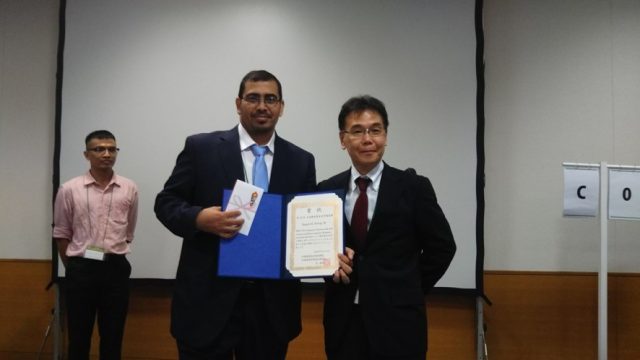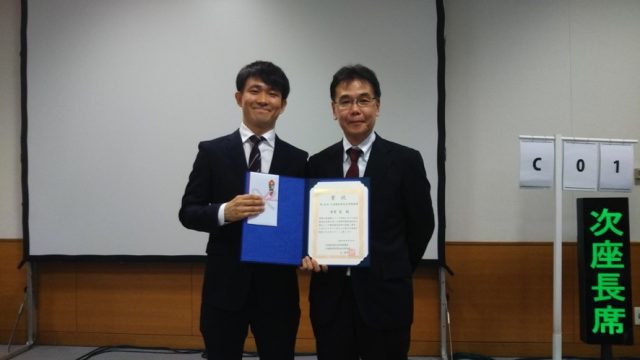Dr. Ragab Fereig (JSPS postdoctoral fellow) and Dr. Akira Soga (JSPS postdoctoral fellow) of the National Research Center for Protozoan Diseases received “the 10th encouragement award of the Japanese Society of Veterinary Parasitologists” in the 162nd meeting of the Japanese Society of Veterinary Science at Tsukuba International Congress Center on Sep. 10–12, 2019. This award is for outstanding young researchers who contributed to the progress of veterinary parasitology and will further develop in the future.
The title of Fereig’s study was “Development of potent and safe vaccine candidates against Neospora caninum infection”. Neospora caninum is a protozoan parasite which induces storms of abortion in pregnant cows and ewes, and paralysis in dogs. To date, no potent and safe vaccine or chemotherapeutic agent is available against such infection. Dr. Fereig evaluated the candidacy of two antigens derived from N. caninum; dense granule 6 (NcGRA6) and cyclophilin (NcCyp) with or without formulation with oligomannose-coated liposomes (OML); an efficient adjuvant and vehicle. Both antigens revealed excellent protective properties against N. caninum infection in immunized mice. The mechanism of protection was deeply investigated and revealed the contribution of both humoral and cellular immunity. In addition, we provided the first direct evidence for the critical role of TLR2 in vaccine studies of N. caninum. This work represents NcGRA6 and NcCyp-OML as potential vaccine candidates against N. caninum infection in mice. Such results would be a valuable addition to the current studies of Neospora vaccine, and could be exploited in establishment of a control policy against neosporosis in the field animals.
The title of Soga’s study was “Development of high efficacy drug selection method for generating transgenic parasites of Plasmodium berghei using an antibiotic toxic to rodent hosts”. Malaria is a global life-threatening disease caused by protozoan parasites of the genus Plasmodium. It has been estimated that the disease causes approximately 400,000 deaths annually. Plasmodium berghei is used as a rodent model for the study of malaria. Dr. Soga successfully developed high efficacy drug selection procedure for generating transgenic parasites of P. berghei using an antibiotic toxic to rodent hosts. This method could reduce time, cost and labor for the generation of transgenic parasites and allow us to generate multiple mutant far more easily compared to conventional method. The method significantly improves the efficacy and flexibility of genetic manipulation of P. berghei, and thus permits us a deeper understanding of malaria parasite molecular biology using a reverse genetics approach.

Dr. Fereig (left) and Prof. Kawazu (the vice-chair of the selection committee)

Dr. Soga (left) and Prof. Kawazu (the vice-chair of the selection committee)
